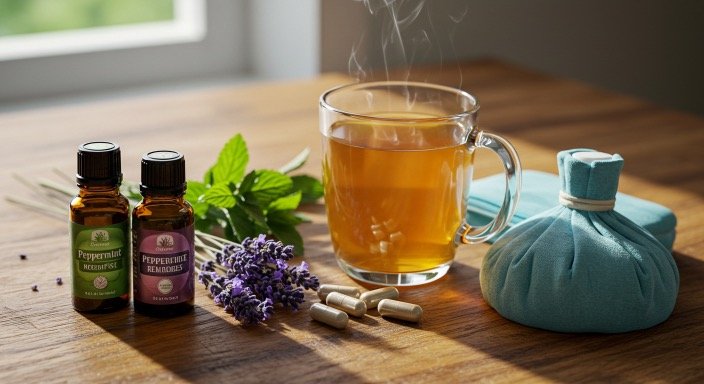We’ve all been there—the sudden throb behind your eyes, that tight band across your forehead, or a dull ache that won’t go away. When headaches strike, reaching for painkillers feels natural. But what if there were natural remedies for headaches that actually worked—methods that ease pain without relying on pills?
Let’s explore evidence-based, easy-to-try solutions that can help you feel better naturally.
Understanding Headache Triggers
Before jumping into remedies, it helps to understand why headaches happen. Common triggers include stress, dehydration, eye strain, poor posture, hormonal changes, and even skipping meals. According to the National Institute of Neurological Disorders and Stroke, tension-type headaches are the most frequent form, affecting nearly everyone at some point.
By identifying your triggers, you can choose the right natural remedy and prevent future flare-ups.
Read also: Understanding Hormonal Health: How Hormones Impact Your Body and Mind)
Natural remedies for headaches
1. Hydration: The Simplest Cure You Might Be Missing
Dehydration is one of the most common, overlooked causes of headaches. Even mild fluid loss can shrink brain tissue slightly, triggering pain receptors. Drinking water often provides relief within 30 minutes.
Try sipping water consistently through the day rather than chugging large amounts at once. You can also include hydrating foods such as cucumber, watermelon, and oranges.
We suggest to read: Sweet Freedom: How to Reduce Sugar and Unlock Better Health)
Natural remedies for headaches
2. Caffeine: A Natural Pain Reliever—In Moderation
Yes, your morning coffee might actually help. Caffeine constricts blood vessels and enhances the effectiveness of pain-relieving compounds. However, too much can cause rebound headaches once the caffeine wears off.
A small cup of coffee or green tea can work wonders when used occasionally, but daily overuse often backfires. Try pairing your caffeine intake with hydration to offset its mild diuretic effect.
Read more in this detailed Harvard Health article on caffeine and headaches.
Natural remedies for headaches
3. Cold or Warm Compress
Sometimes the simplest solutions work best. A cold compress on the forehead can reduce inflammation and numb throbbing pain, especially during migraines. A warm compress, on the other hand, helps ease tension headaches caused by tight neck and shoulder muscles.
Alternate between the two based on what feels better for you. The Mayo Clinic notes that both temperature therapies can provide quick, drug-free relief.
Read our article: Understanding Stress and Its Impact on Blood Pressure)
4. Essential Oils: Aromatherapy That Eases Pain
Essential oils like peppermint, lavender, and eucalyptus are among the most popular natural headache remedies.
- Peppermint oil relaxes muscles and improves blood flow.
- Lavender oil has calming effects, reducing anxiety and migraine intensity.
- Eucalyptus oil helps clear sinus congestion, another common trigger.
Dilute a few drops with carrier oil, then apply to your temples, neck, or wrists. Inhaling the aroma can also calm your mind.
A National Library of Medicine Research supports peppermint oil’s ability to relieve tension headaches quickly.
Natural remedies for headaches
5. Magnesium: The Mineral Many People Lack
Low magnesium levels are linked to chronic headaches, especially migraines. Magnesium helps regulate nerve function, blood pressure, and inflammation—all of which influence pain perception.
You can get more magnesium from leafy greens, almonds, avocado, or supplements. The American Migraine Foundation recommends 400–600 mg daily for migraine prevention, under medical guidance.
Our link suggestion: Foods That Start With A: Nutrient-Rich Choices to Boost Health)
Natural remedies for headaches
6. Herbal Teas: Nature’s Gentle Painkillers

Certain herbs have long been used to calm headaches. Try:
- Ginger tea – reduces inflammation and nausea (common migraine symptoms).
- Chamomile tea – promotes relaxation and sleep.
- Feverfew or butterbur tea – traditional herbs shown to prevent migraines.
According to a study published in Phytomedicine, ginger may be as effective as common painkillers for migraine relief.
Here our article about: How to Make Hair Grow Faster Naturally
Natural remedies for headaches
7. Regular Sleep: Your Brain’s Reset Button
Irregular sleep schedules can throw your hormones and brain chemistry out of balance, triggering headaches. Strive for 7–9 hours of quality sleep each night and maintain a consistent bedtime.
Darken your room, limit screens before bed, and avoid caffeine after noon. Sleep resets your nervous system, reduces stress, and improves pain tolerance.
Source support: Sleep Foundation’s guide on sleep and migraines.
8. Manage Stress with Mindfulness and Relaxation
Stress is one of the biggest headache triggers—and the hardest to control. Practicing mindfulness, deep breathing, or yoga helps calm your nervous system. Even short breathing sessions can lower muscle tension and stress hormones.
The National Library of Medicine highlights meditation and guided imagery as effective non-drug approaches to reduce headache frequency.
We suggest to read also: Positive Affirmations to Reprogram Your Mind for Self-Love)
Natural remedies for headaches
9. Maintain Good Posture

Hours at your computer or phone can cause tight neck muscles and tension headaches.
Try these quick posture checks:
- Keep your shoulders relaxed and your screen at eye level.
- Take breaks every 30 minutes to stretch.
- Support your back while sitting.
According to Johns Hopkins Medicine, improving posture can significantly reduce chronic neck and head pain.
10. Eat Consistent, Balanced Meals
Skipping meals or consuming processed foods can trigger headaches through blood-sugar swings or inflammation. Eat nutrient-dense meals with lean protein, whole grains, fruits, and vegetables.
Common dietary triggers include aged cheese, processed meats, chocolate, and artificial sweeteners. Keep a food journal to identify what affects you.
Source: Harvard Health Publishing’s migraine nutrition advice.
Read also our article: Top 10 Foods Every Man Should Include in His Diet for Better Health
11. Acupressure and Massage
Applying gentle pressure to specific points on your head and neck can stimulate blood flow and relieve tension. Try massaging your temples, jawline, and the base of your skull in small circular motions.
The LI4 pressure point (between your thumb and index finger) is especially effective for tension headaches.
According to Johns Hopkins Integrative Medicine, acupressure can complement other therapies for pain management.
12. Exercise and Movement
It might seem counterintuitive to move when you have a headache, but light exercise like walking, yoga, or stretching improves circulation and releases endorphins—your body’s natural painkillers.
Regular physical activity also reduces stress and improves sleep, both of which prevent future headaches.
Source: Mayo Clinic’s migraine prevention through exercise.
13. Avoid Strong Scents and Environmental Triggers
Perfumes, cleaning chemicals, and even cigarette smoke can trigger headaches for sensitive individuals. Opt for fragrance-free products and keep rooms well ventilated.
A NIH environmental study found that exposure to volatile compounds can worsen migraine symptoms in sensitive populations.
14. Stay Consistent with Prevention
The best natural headache treatment is prevention. Keep a headache diary, note triggers, and adopt healthy daily routines. Over time, you’ll recognize patterns and learn what truly helps your body.
Combining several natural remedies—hydration, magnesium, posture correction, and stress management—often gives the best results.
More information at : Gratitude Examples: Simple Ways to Rewire Your Mind for Positivity)
Comparison Table: Best Natural Remedies for Headaches
| Remedy | How It Works | Best For | Evidence Level | Precaution |
|---|---|---|---|---|
| Hydration | Rehydrates cells and prevents brain tissue shrinkage that triggers pain | Tension headaches, dehydration-related headaches | ⭐⭐⭐⭐ (Strong evidence – Healthline, NINDS) | Avoid overhydration; balance with electrolytes |
| Caffeine (in moderation) | Constricts blood vessels and boosts effectiveness of natural pain relief | Early-stage headaches, mild migraines | ⭐⭐⭐ |
When to See a Doctor
Natural remedies are safe for most people, but persistent or severe headaches may signal an underlying medical issue. If your headaches come suddenly, worsen over time, or are accompanied by vision changes, dizziness, or confusion, seek medical help immediately.
The Mayo Clinic headache guidance lists warning signs that require professional evaluation.
Final Thoughts
Natural remedies for headaches can make a real difference when used consistently and mindfully. From hydration and magnesium to posture and meditation, these holistic approaches treat the root causes—not just the symptoms.
Listen to your body, track your triggers, and combine multiple strategies to find what works best for you. The key is balance—small, consistent habits that support your overall well-being.
Read our article about: Understanding Hormonal Health: How Hormones Impact Your Body and Mind







